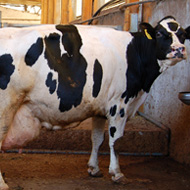
Document contains a summary of the various products available.
A joint statement on the use of flukicides in dairy cattle has been released by the National Office of Animal Health (NOAH) and the Veterinary Medicines Directorate (VMD).
Flukicides are anthelmintic veterinary medicines that are active against parasites from the trematode class. The most common parasite in this class is the liver fluke.
The statement reads: 'Vets, Suitably Qualified Persons (SQPs) and farmers are generally required to follow the instructions on the product labels; however, the prescribing decision rests with the vet, pharmacist or SQP.
'When prescribing, it is important to be aware of withdrawal period requirements specified on the labels and farmers should follow the advice given by the vet or the SQP.'
The statement also contains a summary of the various dairy cattle flukticides products authorised for sale in the UK.
Because some of the products place restrictions on the use of the product depending on the stage of pregnancy, users and prescribers are urged to consider this information carefully when treating animals.
The full document can be read here.



 The Animal and Plant Health Agency (APHA) has updated its online reporting service for dead wild birds.
The Animal and Plant Health Agency (APHA) has updated its online reporting service for dead wild birds.